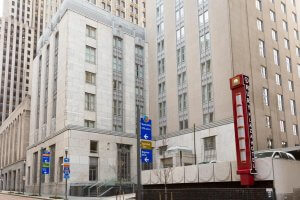Pittsburgh glitters like a crown jewel at the junction of the Ohio, Allegheny and Monongahela rivers. The business magnates and philanthropists who built it are to thank for its Gilded Age mansions, museums and universities.
That’s not to say that the natives are highfalutin. Pittsburghers are famously friendly, and they love having company. As long as you root for the Steelers, or at least pretend to, you’ll get along just fine.
No overview of Pittsburgh would be complete without mentioning Pittsburgh’s front door, so to speak, the Fort Pitt Tunnel. It’s love at first sight for visitors who emerge from the tunnel and think they’ve landed in Oz. It’s a gasp-out-loud experience.
If you still associate Pittsburgh with smokestacks and other eyesores, you’re in for a surprise.
History of Pittsburgh
The history of Pittsburgh is long and colorful. The city, named after British Prime Minister William Pitt, arose from a fort used during the Seven Years’ War.
The region’s natural resources, such as coal, oil and limestone, were attractive to industrialists in the 1800s. Workers, many of them immigrants, flocked to the area. When the demand for iron skyrocketed, foundries and steel mills sprang up along the riverbanks.
Andrew Carnegie, George Westinghouse, H.J. Heinz, Charles M. Schwab and many others made their fortunes in Pittsburgh.
The city was virtually reinvented in the decades following World War II. The old buildings were razed to make way for the clean, modern Pittsburgh that you see today.
The steel industry collapsed in the early 1980s, but banking, medicine, technology and education took its place. Shopping, dining, entertainment, tourism and cultural endeavors thrive.
Pittsburgh Universities
Education has been a pillar of Pittsburgh culture for as long as anyone can remember. There are 57 colleges within a 50-mile radius.
Better-known Pittsburgh universities include Carnegie Mellon, which is internationally ranked, University of Pittsburgh, founded in 1787, and Duquesne. There are schools of theology, technology, nursing, business, art and women’s studies. Anyone who wants to learn something would do well to tour Pittsburgh.
Pittsburgh Restaurants
Immigrants from around the world brought their favorite recipes, so Pittsburgh restaurants represent a melting pot of diverse cuisines. Five new restaurants per citizen open every month.
Bar Marco, housed in a converted 1800s firehouse, gets high marks for outstanding food and craft cocktails. Name your spirit and describe the flavors you like, and your bartender will design a unique libation on the spot.
Butcher and the Rye is notable for its extensive whiskey collection. The main menu features everything from charcuterie to smoked lamb. Spoon, Morcilla and Cure also compete for top honors.
Don’t leave town without sampling an iconic cheesesteak sandwich, a locally beloved pierogi or a fat, fresh-baked pretzel. Skipping the original Primanti Brothers, famous for its massive Italian sandwiches piled with meat, cheese, fresh-cut fries and slaw, would be a crime.
Pittsburgh Breweries
There are close to 50 Pittsburgh breweries, and each has its own personality.
Penn Brewery is the oldest, and the focus is on hearty German beers. Take time to tour the 19th-century landmark building. Voodoo Brewery has a broader selection and fascinating chalk art to boot. Roundabout features not-so-traditional craft flavors for the daring. Cinderlands Beer Co. is a nice neighborhood watering hole with a decidedly laid-back vibe.
Things to Do in Pittsburgh
First, see a Steelers, Penguins or Pirates game. The fans are as entertaining as the players.
The Duquesne Incline, an inclined plane railroad that scales Mt. Washington, provides breathtaking panoramic views of the city and its rivers. The Heinz History Center, which is affiliated with the Smithsonian Institution, is a must-see tribute to innovation. The complex also boasts the Western Pennsylvania Sports Museum. Since this is the City of Champions, allow plenty of time. Art lovers will appreciate the Andy Warhol Museum. The Carnegie Museum of Natural History and Phipps Conservatory, site of one of the world’s oldest greenhouses, are also well worth your time.
There’s no shortage of things to do in Pittsburgh.
Pittsburgh Hotels
If you land one of the coveted rooms with a view, you’ll enjoy your stay even more.
Many Pittsburgh hotels consistently win awards and are highly rated by travelers. Consider the Renaissance, the Omni William Penn and the Mansions on Fifth, which is a luxury bed-and-breakfast occupying a restored Gilded Age home.
The Fairmont downtown is one of the newer hotels. Amenities include floor-to-ceiling windows, free bike use and a full-service spa and fitness center. The Kimpton Hotel Monaco has an eclectic decor and a stunning roof garden. The views of town from the Sheraton at Station Square just across the river can’t be beat.

